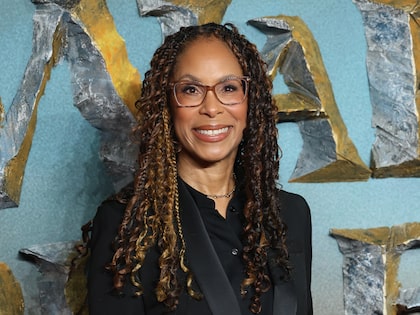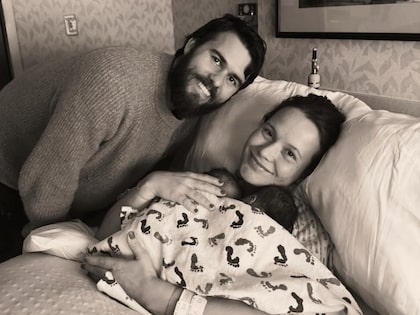Celebrity News August 19, 2024
Phil Donahue, King of Daytime Talk, Dies at 88, Wife Marlo Thomas Mourns 'My Sweetheart'
 Getty Images
Getty Images
Phil Donahue, the talk show host who became the first to include audience participation and to delve into divisive social issues, died Sunday following a long illness, "Today" reports. He was 88.
His family said in a statement that the man known as the King of Daytime Talk, to Oprah's Queen, died at home surrounded by his family, including his wife of 44 years, "That Girl" star Marlo Thomas, 86; his sister; his children; his grandchildren; and his golden retriever, Charlie.
 Splash News
Splash News
The family urged fans to donate to St. Jude Children’s Research Hospital, founded by Thomas' TV-legend dad Danny Thomas, or to the Phil Donahue/Notre Dame Scholarship Fund.
On Monday, Thomas wrote a long note to fans about her loss. "I'm sure by now you've heard the very sad news that I lost my sweetheart last night, so I know you will understand that I'll be stepping away from this page for a while to take care of myself and the many people who took care of Phil, and held him close to their hearts," she wrote. She included a sweet personal snap of the two vacationing many years ago.
 Instagram
Instagram
“The Phil Donahue Show," later known simply as “Donahue,” ran for 29 years, from 1967 to 1996, launching in Dayton, Ohio, before going national. Filmed in Chicago and later NYC, it was characterized by — and frequently parodied, as by Phil Hartman on "SNL" — for Donahue's earnest and well-informed questioning of expert guests, and his goading of an in-studio audience eager to be a part of a lively debate.
Issues covered on "Donahue" included alcoholism, drug abuse, abortion rights, consumer protection (his most frequent guest was Ralph Nader), homosexuality, drag, AIDS, U.S. foreign policy, race, rape and other sexual abuse, parenting, feminism, hip hop culture, and more. Some of the topics were broached for the first time to a mass audience during the day by Donahue.
He also interviewed a slew of top stars and newsmakers, including Ronald Reagan, Bill Clinton, Gloria Steinem, the Jackson Family, Farrah Fawcett, Audrey Hepburn, John Wayne, and more. He met his future wife by interviewing her on his show.
She remembered on Facebook in 2015, "Phil and I met on his talk show... in 1977 — it was instant chemistry. He flirted, I giggled, and his TV audience watched us fall in love."
When his influential show ended after some 6,000 installments, he went on to briefly host a show on MSNBC, from 2002-2003, before retiring from the format.
 Instagram
Instagram
Donahue was the recipient of 20 Emmys, including 10 for Outstanding Talk Show Host and 10 for his show, which he created, wrote, and produced as well as hosted. He received the prestigious Peabody Award in 1980 and in 2024 was awarded the Presidential Medal of Freedom, one of the two highest civilian honors in the U.S.
In 2007, "Body of War," a doc he co-directed with Ellen Spiro, was short-listed for Oscar consideration.
Born December 21, 1935, in Cleveland, he got his start in media doing morning farm reports for WNDU-TV on the Notre Dame campus. From an early age, he was a free speech absolutist, leading to his desire to air as many views as possible.
He wed his college girlfriend in 1958 and they had five children together, but the union ended in divorce in 1975.
After that, his primary interest for many years was journalism, including the 90-minute radio show "Conversation Piece" that he hosted in 1963. The show made use of remote interviews, allowing locals who called in to speak with everyone from Robert Kennedy and Martin Luther King Jr. to Hugh Hefner.
Thanks to Donahue's instincts, the show also delved into controversial subjects, including speaking with a man about what it was like to be gay and to an OB-GYN to air health issues previously forbidden as topics for radio.
He launched "The Phil Donahue Show" on TV with his first guest, atheist activist Madalyn Murray O'Hair.
From there, the show expanded as Donahue added a studio audience, and as he continued to lean into women's issues and interests. By 1978, the show, which went into first-run syndication in 1970, was such a ratings success story that Donahue was on the cover of TV Guide. The bible of television referred to his creation as a "phenomenon."
In the end, Donahue offered midwestern humility when asked the secret of his success with "Donahue," writing in his 1979 memoir, "The show’s style... developed not by genius, but by necessity. The familiar talk-show heads were not available to us in Dayton, Ohio.. The result was improvisation."

















